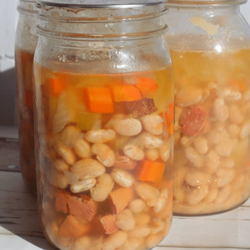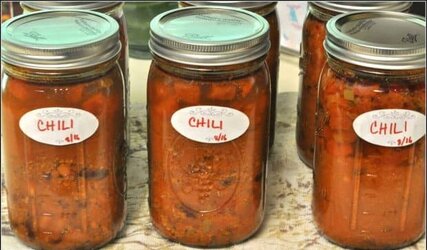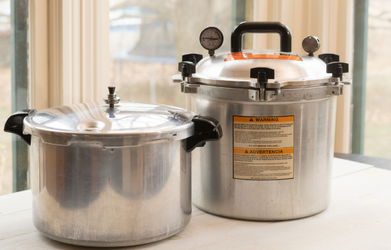- Joined
- Jan 29, 2021
This post is less of a how-to and more of an FAQ directing to resources that can. There are plenty of how-to articles that are backed by scientific institutions who’ve tested methods and recipes that are updated and more accurate than a KF thread.
What is pressure canning?
Pressure canning is a process for low-acid foods such as meats and vegetables. This involves heating the jars in a pressurized vessel at a specific pressure and temperature minimum until the food inside is sterile and sealed from the outside.


What does it entail?
Pressure canning consists of:
Will canning prepare me for economic collapse or save me money?
No. Canning has a large upfront cost and takes a lot of time to do. Unless you have a use case like meal prep or excess vegetables(large garden) then it’s not worth it. You’re better off disaster prepping by buying canned food on sale at the grocery store. Freezing is a much better alternative for meats, pasta sauce, and soups anyways.
How long does the food last?
Indefinitely if the seal holds and the jars are kept from sunlight. Realistically the food lasts about 12 to 18 months. The food remains safe to eat but there’s potential degradation in taste and texture. The “new” seals from Ball lids are guaranteed for 18 months but the seals typically last much much longer.
Can I pressure can everything?
No. You are extremely limited in what you can preserve.
A non-exhaustive list of what you can’t:
Is canning easy?
Yes but it requires education, an initial investment into the tools, and time. Canning can take half a day from prep to cleanup.
You must learn packing methods, head spacing, caveats like using dry beans/lentils, lid tightening, knowing when the canner is devoid of air, which recipes may cause seal failure, etc.
Where do I get recipes?
Start with US University extensions. They provide a lot of valuable information and recipes tested by their labs. Don’t trust random blogs unless you’ve gained enough experience to notice ingredients that can’t be canned and times/pressures that don't make sense.
Which canner should I buy?
There are two main variants of pressure canner, the thin-walled steel ones and the thick walled aluminum ones. The aluminum ones(All American) are more durable but are substantially more expensive and heavier. They’re only worth it if you can a lot and over a long time. The less expensive steel ones have gaskets you need to replace over time but work fine.

Why aren’t you autistically holding my hand?
The information is much better presented on these sites linked below which are updated more than a KF thread post would.
Are you LARPing?
No. I've pressure canned as a hobby and accumulated ~250 jars at the hobby's peak.
How do I get started?
Read the links below and decide if you want take it up as a hobby. If so, you need a pressure canner, jars, can lifter, headspace tool, etc. All information you need is on the extension websites.
The National Center for Home Food Preservation
https://nchfp.uga.edu/
Clemson University Extension
https://hgic.clemson.edu/factsheet/canning-foods-at-home/
https://www.clemson.edu/extension/food/canning/canning-tips/index.html
University of Minnesota Extension
https://extension.umn.edu/food-safety/preserving-and-preparing#canning-1960960
South Dakota State Extension
https://extension.sdstate.edu/guide-pressure-canning
The All New Ball Book of Canning and Preserving(attached below)
What is pressure canning?
Pressure canning is a process for low-acid foods such as meats and vegetables. This involves heating the jars in a pressurized vessel at a specific pressure and temperature minimum until the food inside is sterile and sealed from the outside.


What does it entail?
Pressure canning consists of:
- Filling the canner with water to the appropriate line.
- Prepping your food to be canned.
- Filling the jars with said food.
- Putting the jars into the canner.
- Keeping the canner at the required pressure for the required time(a lot are 60-90 mins).
- Letting the canner cool.
- Removing the jars.
Will canning prepare me for economic collapse or save me money?
No. Canning has a large upfront cost and takes a lot of time to do. Unless you have a use case like meal prep or excess vegetables(large garden) then it’s not worth it. You’re better off disaster prepping by buying canned food on sale at the grocery store. Freezing is a much better alternative for meats, pasta sauce, and soups anyways.
How long does the food last?
Indefinitely if the seal holds and the jars are kept from sunlight. Realistically the food lasts about 12 to 18 months. The food remains safe to eat but there’s potential degradation in taste and texture. The “new” seals from Ball lids are guaranteed for 18 months but the seals typically last much much longer.
Can I pressure can everything?
No. You are extremely limited in what you can preserve.
A non-exhaustive list of what you can’t:
- Grains(will disintegrate)
- Dairy
- Eggs
- Starchy foods(potatoes are okay but will discolor over time)
- Leafy greens
- Soft vegetables
- Soft fruits
- Corn starch
- Fats(can go rancid)
Is canning easy?
Yes but it requires education, an initial investment into the tools, and time. Canning can take half a day from prep to cleanup.
You must learn packing methods, head spacing, caveats like using dry beans/lentils, lid tightening, knowing when the canner is devoid of air, which recipes may cause seal failure, etc.
Where do I get recipes?
Start with US University extensions. They provide a lot of valuable information and recipes tested by their labs. Don’t trust random blogs unless you’ve gained enough experience to notice ingredients that can’t be canned and times/pressures that don't make sense.
Which canner should I buy?
There are two main variants of pressure canner, the thin-walled steel ones and the thick walled aluminum ones. The aluminum ones(All American) are more durable but are substantially more expensive and heavier. They’re only worth it if you can a lot and over a long time. The less expensive steel ones have gaskets you need to replace over time but work fine.

Why aren’t you autistically holding my hand?
The information is much better presented on these sites linked below which are updated more than a KF thread post would.
Are you LARPing?
No. I've pressure canned as a hobby and accumulated ~250 jars at the hobby's peak.
How do I get started?
Read the links below and decide if you want take it up as a hobby. If so, you need a pressure canner, jars, can lifter, headspace tool, etc. All information you need is on the extension websites.
Wide mouth jars are easier to pack and empty. I’m not sure if the lids have a higher failure rate when cooking than regular mouth.
Don’t buy the chinese lids. Unless you want to test them yourself, I wouldn’t trust them.
Ball and Anchor-Hocking jars and lids are the only real ones. IIRC, Ball owns Anchor-Hocking.
Can food you want to eat. If you don’t, you’ll waste money and space on food you’ll never eat.
Canned soups and vegetables from the grocery store are usually better tasting, especially the canned soups. Their vacuum canning method allows them to can things you can’t with a pressure canner.
Don’t buy the chinese lids. Unless you want to test them yourself, I wouldn’t trust them.
Ball and Anchor-Hocking jars and lids are the only real ones. IIRC, Ball owns Anchor-Hocking.
Can food you want to eat. If you don’t, you’ll waste money and space on food you’ll never eat.
Canned soups and vegetables from the grocery store are usually better tasting, especially the canned soups. Their vacuum canning method allows them to can things you can’t with a pressure canner.
The National Center for Home Food Preservation
https://nchfp.uga.edu/
Clemson University Extension
https://hgic.clemson.edu/factsheet/canning-foods-at-home/
https://www.clemson.edu/extension/food/canning/canning-tips/index.html
University of Minnesota Extension
https://extension.umn.edu/food-safety/preserving-and-preparing#canning-1960960
South Dakota State Extension
https://extension.sdstate.edu/guide-pressure-canning
The All New Ball Book of Canning and Preserving(attached below)
Attachments
Last edited: